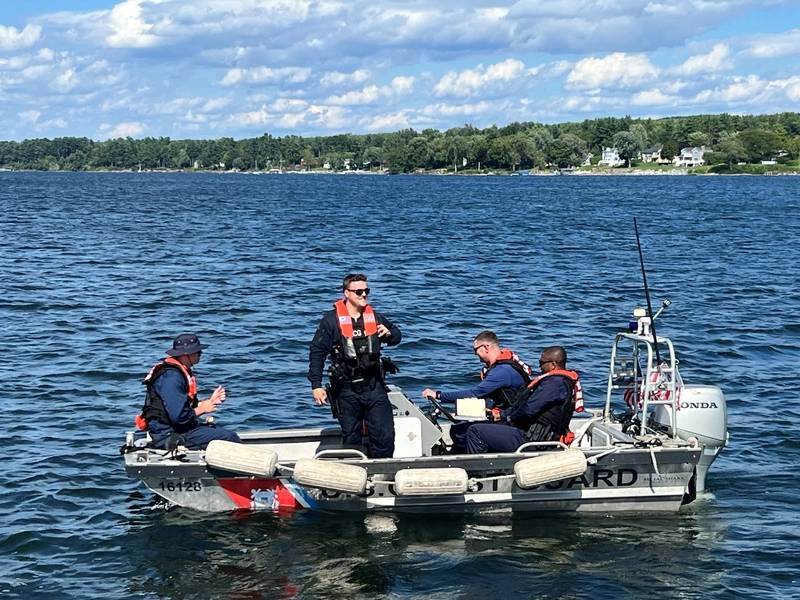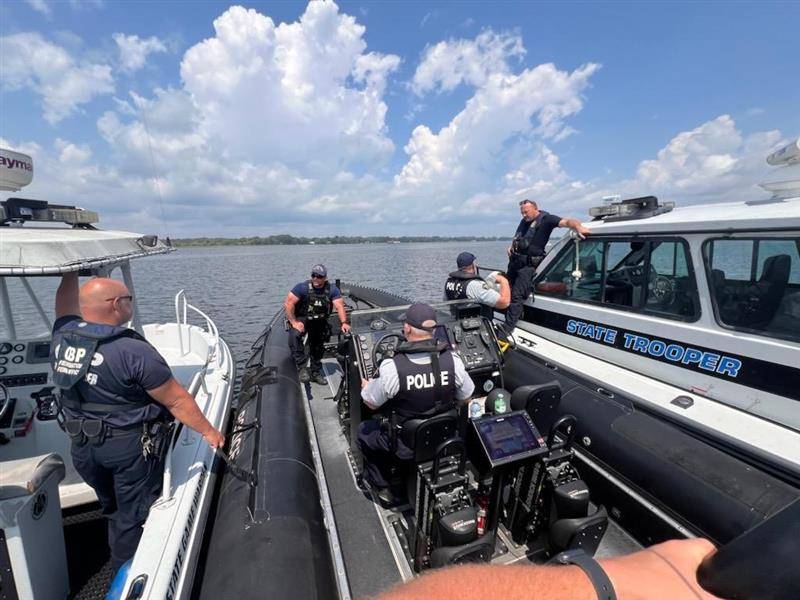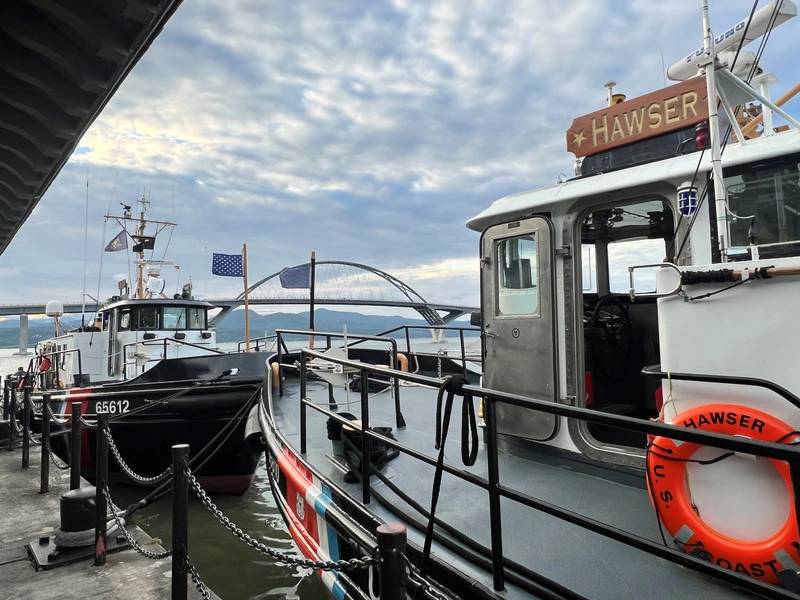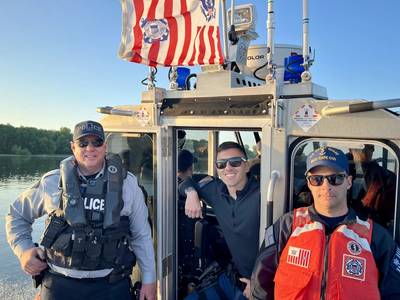Operation Summerstock: Strengthening Security and Saving Lives
Summer is easily the busiest season for the U.S. Coast Guard. New England is no exception, people flock to the beaches to swim, and recreational boating is at its peak. Many destinations along the coasts are hot spots for tourism and increased safety checks by local Coast Guard units. However, sometimes people of coastal states forget that the Coast Guard's presence extends inward to our inland lakes and waterways.
One of those inland bodies of water is Lake Champlain, and not only is it shared by New York State and Vermont, but it's also part of Canada. Coast Guard Station Burlington, a small boat station with approximately 25 enlisted members, patrols the lake daily.
Over the years, commercial traffic on Lake Champlain has diminished, but recreational boating has increased dramatically. Search and rescue cases became more frequent, creating the need for a Coast Guard presence to protect against loss of life and property on the lake. Along with SAR, the enforcement of laws and treaties became necessary, as did the enforcement of recreational boating safety.
To address these growing needs, the Coast Guard initiated Operation Summerstock.
 (Photo: U.S. Coast Guard)
(Photo: U.S. Coast Guard)
Summerstock, started in the Great Lakes in 2017, and has since extended to Lakes Champlain and Memphremagog to address the growing safety concern with increased recreational boating traffic. As well as achieve full implementation of the Department of Homeland Security’s Northern Border Strategy. It is a collaborative effort with international, federal, state and local law enforcement agencies, with the goal of maintaining border integrity. Summerstock aims to promote and improve integrated operations that identify, interdict, investigate and disrupt terrorists and other illicit cross-border activities.
Coast Guard Sector Northern New England shares 125 nautical miles of maritime border with Canada. This stretch of border does not have a continuous law enforcement presence, making it susceptible to exploitation. To counter this, the Coast Guard works with domestic and international partners under the U.S. and Canada Shiprider Program to increase law enforcement presence during the peak boating season from June to September.
To be readily equipped, members from around the First District, including U.S. Coast Guard Cutter’s Hawser and Wire, Maritime Safety and Security Team Cape Cod, and Sector New York enforcement department, all joined in support of U.S. Coast Guard Sector Northern New England and Coast Guard Station Burlington.
These combined efforts brought together diverse units with specialized roles. As Ens. Max Bonjean of Sector New York's enforcement division explained, "Summerstock serves as a force multiplier for maritime law enforcement. It is a unique and truly collaborative effort because it brings the Coast Guard in, other Homeland Security partners, and Canadian agencies."
In addition to active-duty personnel and partner agencies, Coast Guard Reservists are essential to the operation. Activated for Summerstock, they provide crucial support to Station Burlington by conducting law enforcement and safety boardings.
 (Photo: U.S. Coast Guard)
(Photo: U.S. Coast Guard)
During Summerstock, reservists from across the Coast Guard and crews from D1 surged to support Sector Northern New England to complete more than 400 mission hours and 370 boardings. Of those mission hours, more than 100 hours and nearly 180 boardings were completed with the Royal Canadian Mounted Police, U.S. Customs and Border Patrol, Homeland Security Investigations, New York State Police and the Vermont Fish and Wildlife Department. The collective efforts resulted in 13 denials of entry of foreign nationals, 20 pounds of agricultural seizures, 37 safety violations, and eight voyage terminations for unsafe conditions.
Among these efforts, different units focused on specific missions. Safety inspections were the primary mission of the Hawser and Wire crews.
"There is a whole list of things we did on the cutter side to assist," said Petty Officer 1st Class Zachary Shade, the executive petty officer on the Cutter Hawser. "Our job was recreational boating safety. We embarked a boarding team from Sector New York. Some of the key things we checked were properly fitted life jackets for everybody onboard and fire extinguishers."
Shade noticed a common discrepancy, which many people were unaware of.
"About two years ago, the law changed that marine fire extinguishers expire after 12 years," said Shade. "There were a few that were well over that even though the gauges on them said they were still good. It's a good teaching moment for the public since not everyone monitors marine law like we do; we are just trying to help."
While the Hawser crew concentrated on safety inspections, other teams had different focuses. For Lt. j.g. David McQuillan and MSST Cape Cod, operations centered on law enforcement and interagency collaboration.
 (Photo: U.S. Coast Guard)
(Photo: U.S. Coast Guard)
"We worked a lot with CBP and the Royal Canadian Mounted Police," said McQuillan. "Our members at the MSST worked with the Maritime Law Enforcement Academy and the RCMP to qualify and be designated cross-border maritime law enforcement officers. The biggest takeaway from the operation was how different all the agencies were but how integral it is to work with our partners. We all intertangle into the larger network that is cross-border maritime. It's complex, but programs like [Summerstock] make it easier while protecting everyone's rights."
The MSST conducted patrols on both Lake Champlain’s and Memphremagog’s Canadian and U.S. sides. Patrols like this assist with counterterrorism, contraband enforcement and illegal entry into either country. Patrols like this help stop terrorism, smuggling, and illegal entry into both countries. Illegal crossings increased significantly, from 915 in 2019 to more than 18,000 in 2024.
Although the focus was primarily on law enforcement, the crews also participated in other Coast Guard missions, like search and rescue. For example, they saved three kids from the water after their catamaran flipped over and helped a person showing signs of a stroke.
Reflecting on these diverse operations, Bonjean shared his perspective: "Operation Summerstock represents the best of what the Coast Guard does. We leverage the skills and expertise of our active-duty and reserve members and gain more knowledge from the wonderful collaboration with our partner agencies. Operations like this seem small but help to ensure national security—even if it's just one mission at a time."
Operation Summerstock showcases how the U.S. Coast Guard's busiest season isn't just along the coasts of America. It highlights our crucial presence on inland waters in states like Vermont and New York. The Coast Guard and its partners work together every year to ensure the safety and security of everyone on Lakes Champlain and Memphremagog. These types of joint operations and partnerships underscore that it doesn't matter where the Coast Guard operates; we remain committed to protecting lives and maintaining security on all our waterways.














